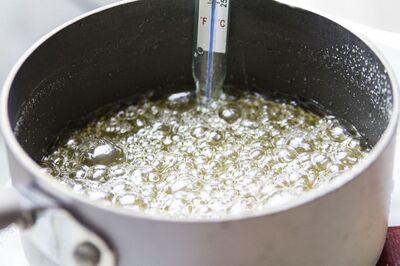Sugar temperatures: Difference between revisions
Jump to navigation
Jump to search
No edit summary |
No edit summary |
||
| Line 1: | Line 1: | ||
[[Useful stuff|⇐ Useful stuff]] | [[Useful stuff|⇐ Useful stuff]] | ||
[[File: | [[File:Spun-Sugar-Spider-Webs-6310.jpg|400px|left]] | ||
<br clear=all> | <br clear=all> | ||
Latest revision as of 15:09, 25 October 2024

| Name | Temperature | Touch Test1 | Use |
|---|---|---|---|
| Syrup | 100℃ | Coats a spoon | Basic syrup |
| Small thread | 106℃ | Pulls into threads between fingers | Pâtes de fruits - Fruit pastes |
| Soft ball | 115-116℃ | Forms soft ball when rolled | Jams and jellies |
| Firm ball | 120-124℃ | Forms firm ball when rolled | Italian meringue |
| Hard ball | 125-128℃ | Forms hard ball when rolled | Marshmallows |
| Soft crack | 130-140℃ | Thread bend before breaking | Candies |
| Hard crack | 145-155℃ | Forms brittle threads which break when bent | Poured, pulled, spun, bubble sugar, etc. |
| Light caramel | 155-160℃ | Light brown | Caramel coating for fruit, fritters etc. |
| Caramel | 165-175℃ | Dark brown | Crème caramel or flavouring |
1 Touch test - Drop a little cooked sugar into a bowl of very cold water. Remove sugar and touch and interpret.
Patisserie Christopher Fielder